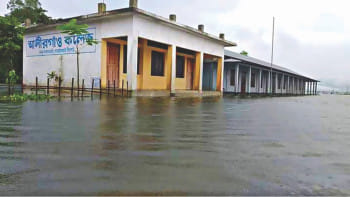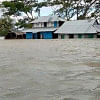Bangladesh should advocate nature conservation at COP28

Like every year, 2023 is ending with another Conference of the Parties (COP) under the United Nations Framework Convention on Climate Change (UNFCCC). The COP28 will be held in Dubai, in the UAE, from November 30 till December 12. On December 9, participants will join a thematic session on nature, land use and the ocean, with a focus on restoring ecosystems and special focus on mangroves, on protecting 30 percent of the world's lands and seas by 2030, as a part of climate action, on making climate finance nature-positive, and on considering nature in our towns and cities. In terms of Bangladesh, I can propose two other important issues to be discussed on December 9.
The first issue focuses on combining our climate change and biodiversity conservation strategies and frameworks. Bangladesh has already made that integration at the policy level, even more strongly over the last four years. Let's take the National Adaptation Plan of Bangladesh 2023-2050 (NAP2050) as an example. Approved in October 2022, the NAP2050's fourth goal promotes nature-based solutions (NbS) for biodiversity conservation and community well-being, to be achieved through 21 interventions and with an estimated Tk 51,500 crore. Similarly, the Mujib Climate Prosperity Plan 2022-2041 (MCPP2041) has deeply mainstreamed NbS into our journey towards prosperity. At COP28, our delegates should underscore Bangladesh's leadership in integrating nature conservation into climate action.
But what about the other way round—that is, integrating climate action into biodiversity conservation?
In December 2022, at the 15th UN biodiversity conference, member nations adopted the Kunming-Montreal Global Biodiversity Framework (GBF). This strategic document, prepared under the UN Convention on Biological Diversity (CBD), acknowledged climate change in several of its 23 targets (to be achieved by 2030). At national level, to comply with the CBD, Bangladesh updated its National Biodiversity Strategy and Action Plan (NBSAP) in 2016 for a six-year period. So, we must now ensure that the forthcoming NBSAP strongly adopts climate action by protecting, conserving, restoring, sustainably managing, and creating diverse terrestrial and aquatic ecosystems.
The second issue I want to focus on is resilience as well as transformation of ecosystems and agrifood systems under climate change, especially through multi-stakeholder partnerships. We need to consider agriculture and agrifood systems as part of a much broader social-ecological system. It is not enough only to increase the adaptive capacity of our social and economic systems to reduce our vulnerability to climate change. Our diverse ecosystems' capacity to adapt to climate change should be improved as well.
NbS in agriculture includes conservation agriculture (such as practising zero or low tillage, keeping organic cover in agricultural field, and increasing crop diversity), agroforestry (such as combining crops and trees on arable land), pasture management, water management, ecosystem-based aquaculture, and sustainability fisheries/wetland management. At COP28, Bangladeshi delegates need to advocate for NbS in agrifood systems to make our agriculture climate-smart. While doing so, we should also highlight Bangladesh's almost 30-year experience of community-based natural resource management, adaptation, and co-management of protected areas.
I have a final request to the Bangladesh delegation at COP28. Since the establishment of a Loss and Damage Fund at COP27 in Egypt last year—a big milestone in the history of the UNFCCC negotiation—much has been discussed on how to make this fund functional. Nevertheless, when we discuss climate change-induced losses and damages, we need to remember that the loss of biodiversity and agrobiodiversity, and associated traditional/indigenous knowledge and practices, are part of "non-economic losses and damages." But these shouldn't be undermined simply due to our inability to readily estimate these losses in monetary terms.
The existing climate change-related funds, such as the Global Environment Facility, the Green Climate Fund or the Adaptation Fund, also channel money to tackle loss and damage from climate change through the projects they support. While the new Loss and Damage Fund will take some time to start functioning, we need to explore other funding options. At the COP28, Bangladeshi delegates should advocate for directing funds from the newly established GEF-managed Global Biodiversity Framework Fund (GBFF) to reduce and stop climate change-induced biodiversity and ecosystem loss.
In light of the above opportunities to show leadership at COP28, in the post-GBF era, Bangladesh should make a prompt move to establish the Biodiversity Conservation Fund, as provisioned in the Bangladesh Biodiversity Act, 2017 almost seven years ago. Coupled with its pioneering 13-year-old Bangladesh Climate Change Trust Fund (BCCTF), the new biodiversity fund could be a milestone in integrating biodiversity conservation and climate action.
Dr Haseeb Md Irfanullah is an independent consultant working on environment, climate change, and research systems. He is a visiting research fellow at the University of Liberal Arts Bangladesh (ULAB). He can be reached at [email protected]


 For all latest news, follow The Daily Star's Google News channel.
For all latest news, follow The Daily Star's Google News channel. 












Comments